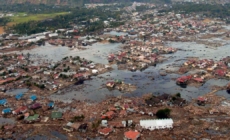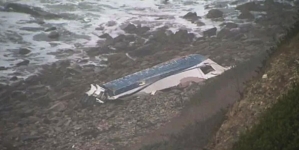-
Did Russia Shoot Down Azeri Plane That Crashed in Kazakhstan? What We Know - 9 mins ago
-
Supermodel Petra Nemcova says it’s still ‘difficult’ to discuss surviving tsunami on its 20th anniversary - 19 mins ago
-
She stabbed her boyfriend to death during a fight. Was it self-defense? - 29 mins ago
-
Man Backed Over Reason He Didn’t Pay for Wife’s ‘Emergency’ Surgery - 48 mins ago
-
Jennifer Love Hewitt calls out aging in Hollywood - 58 mins ago
-
Phoenix Airport Shooting Reports: What We Know - 2 hours ago
-
Triston Casas Trade for Pitcher Now Off Table After Red Sox Sign Walker Buehler - 2 hours ago
-
20 years after a devastating tsunami, a survivor celebrates what the disaster has given him - 3 hours ago
-
How to Watch Lakers vs Warriors, Live Stream NBA, TV Channel - 3 hours ago
-
Heat list Jimmy Butler as doubtful for Thursday after reported trade request - 3 hours ago
A day without Mexicans in Mammoth? Locals mull how to get a message to Trump
MAMMOTH LAKES, Calif. — If all the service workers born in Mexico stayed home from their jobs for just one day in this thriving resort town perched high in California’s Sierra Nevada, the humming tourist economy would probably faceplant harder than a first-time skier on an icy expert slope.
Most of the restaurants would have no staff, residents say. Hotels and Airbnbs would suffer the same fate. Construction projects across this posh skiing destination would come to a grinding halt.
“I think that would be like one of those zombie movies,” said Jose Diaz, 33, from Sinaloa, a supervisor at the Stove, a cozy breakfast spot in the heart of town.
Like so many others who have made their way here from small towns in Mexico, Diaz didn’t come for the skiing. He had heard through the grapevine that Mammoth was a good place to earn a steady paycheck.
Restaurant kitchens and hotel break rooms in Mammoth Lakes have been buzzing with the notion of Latino workers staging a one-day strike to demonstrate the town’s dependence on imported labor.
(Brian van der Brug / Los Angeles Times)
That was 14 years ago. Now, Diaz and his wife — she’s from Guadalajara, and they met working at a Mammoth restaurant — are both here legally, he said. They have two kids born in the U.S. and recently bought a condo in town.
But, like almost everyone else in this alpine community of about 7,000 people, they have friends and family who would be vulnerable if President-elect Donald Trump’s pronouncements about deporting millions of undocumented immigrants actually come to pass.
Locals are torn about how exactly to respond. Some workers say they are counting on Trump, given his business background, to take a softer stance when it comes to resort towns such as Mammoth and South Lake Tahoe, whose economies would be devastated by mass deportations.
Others urge something more proactive: Restaurant kitchens, hotel break rooms and group chats have been buzzing with the notion of Latino workers staging a one-day strike to demonstrate the town’s dependence on imported labor.
Mayor Chris Bubser said she sympathizes with the growing anxiety around deportations, but hopes the strike doesn’t materialize.
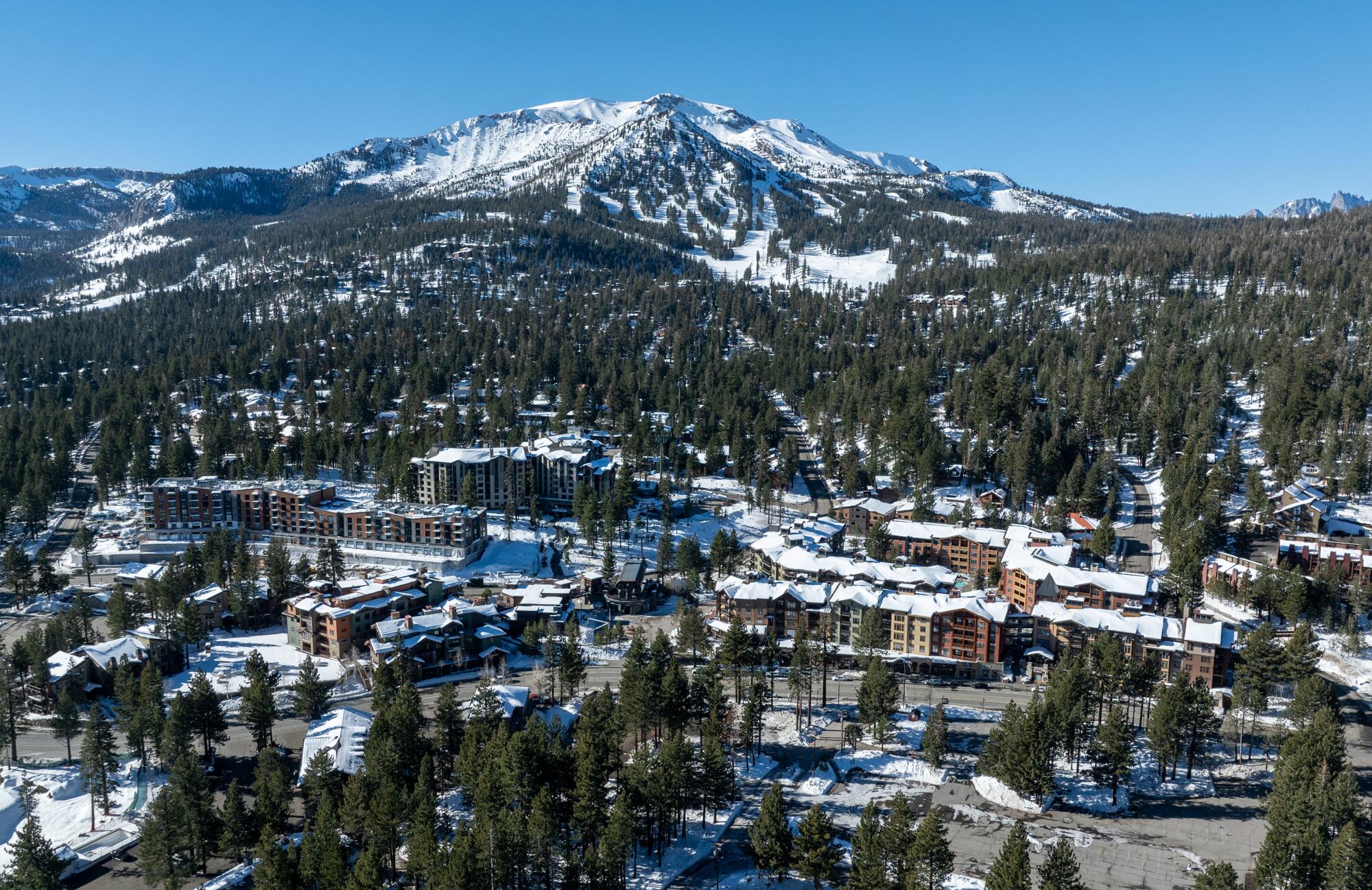
Mammoth Lakes residents say their resort town would be devastated if the undocumented workers who provide much of the labor were swept up in mass deportations.
(Brian van der Brug / Los Angeles Times)
“I feel badly for the business owners, because they’re not the ones making these awful threats and they’d be left in the lurch,” Bubser said.
As state and local officials across California grapple with the potential consequences of Trump’s proposed deportations, the natural focus is on farm communities in the Central Valley, where roughly half the people working in the fields and orchards are believed to be undocumented.
But pricier ZIP Codes are vulnerable, too, and it’s hard to imagine anywhere in the state that would suffer more than Mammoth Lakes if a substantial percentage of its undocumented workforce suddenly disappeared.
That’s because almost all of the tourists who flock to this internationally renowned resort are white-collar professionals. And the people who own property are, by and large, real estate investors, skiers with enough money to afford a second home or well-to-do retirees who headed for the hills to escape the congestion of coastal cities. None of them are likely to respond to help-wanted ads for line cooks and snowplow drivers.
So, immigrants end up doing most of the labor.

A worker moves lumber at a condominium construction site in Mammoth Lakes.
(Brian van der Brug / Los Angeles Times)
About a third of Mammoth’s population is Hispanic, according to the U.S. Census Bureau, and more than half the students in the local public school system are from Spanish-speaking homes.
Many of the Latinos in town are citizens or green card holders, some from families who have lived here for generations. But residents guess at least half are in the country illegally. They’re not hard to find.
On a recent chilly afternoon, about a half dozen men were clearing snow from a commercial office building in town. The roofing company owner asked to be identified only as Julio, because he is undocumented. He said he has been doing construction work in the U.S. since 1989, most of that time in Mammoth Lakes.
His company has 15 employees, he said. He also has three kids, all U.S. citizens; his oldest is an officer for the California Highway Patrol.
He has doubts about the benefits of a one-day strike by Latino workers: “The purpose of doing it is to show that Hispanic labor is necessary, but I’m pretty sure everyone already knows that,” he said with a shrug.
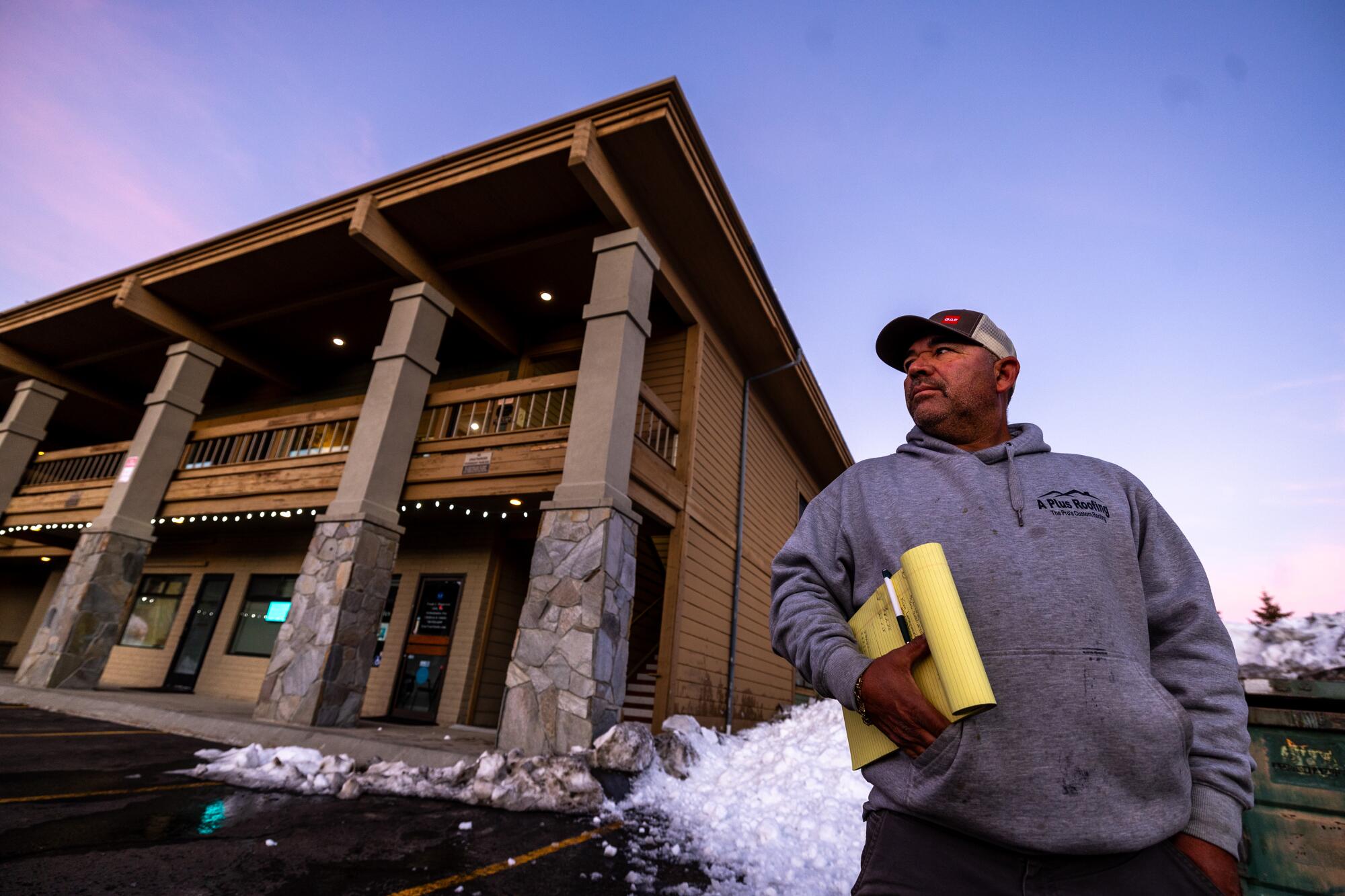
Roofing contractor Julio at a Mammoth Lakes job site last week.
(Brian van der Brug / Los Angeles Times)
He mentioned the record snowfall in the winter of 2022-23, when homeowners were desperate to get snow off their roofs before their houses collapsed.
“I didn’t see a whole lot of Americans, you know, white guys, up on those roofs,” Julio said.
He’s not worrying much about the talk of deportations, he said, in part because he sees no point in stressing about something he can’t control. But he also said he thinks Trump is a rational businessman who must know how much undocumented laborers add to the economy.
And Trump is in construction, Julio joked, so, “I’m pretty sure he’s got some undocumented people working for him, too.”
In fact, while Julio was put off by the sweeping, derogatory comments Trump made about Mexicans during the campaign, he thinks Trump is “a pretty good president.” He’s right about deporting people who come across the border illegally “looking for free stuff,” Julio said.
“I’ve been working my ass off,” Julio said. “I pay all my medical bills out of my pocket, my dentist, my vision. I didn’t get any low-income housing, because I don’t think I need it.”
He hopes Trump will spare hard workers, like him, who “make the country stronger,” he said. But he’s fine with deporting lazy people.

A kitchen worker at a popular Mammoth Lakes restaurant takes a short break for breakfast.
(Brian van der Brug / Los Angeles Times)
“Whoever doesn’t benefit the country, kick them out of here,” he said.
For others, the shocking breadth of Trump’s threat to deport up to 11 million undocumented U.S. residents is terrifying. It’s hard for them to imagine how a dragnet of that size could pause to consider the merits of individual cases.
A secretary in the Mammoth school system, who asked only to be identified as Maria, is one of the people who is worried.
She said she came from Mexico with her mother when she was a kid and has since been granted U.S. citizenship. But her husband, who has worked in construction in Mammoth for more than 20 years, is undocumented.
He got caught coming across the border illegally when he was 14, and has not been able to “adjust his status,” she said.
Maria and her husband have three kids, all born in the U.S. One is about to join the military, she said. But the kids follow the news and hear the gossip at school, and their anxiety is building.
“My 10-year-old is terrified with the new president saying he’s going to deport everyone,” Maria said.
In addition to working in construction, her husband has worked as a bus driver for the school district and recently started his own snow removal business. He has an Individual Taxpayer Identification Number, or ITN, a document issued by the Internal Revenue Service to foreign nationals — including undocumented immigrants — so that they can pay taxes like everybody else.
“He is a responsible guy, a hard-working guy, with no ugly background at all,” Maria said.
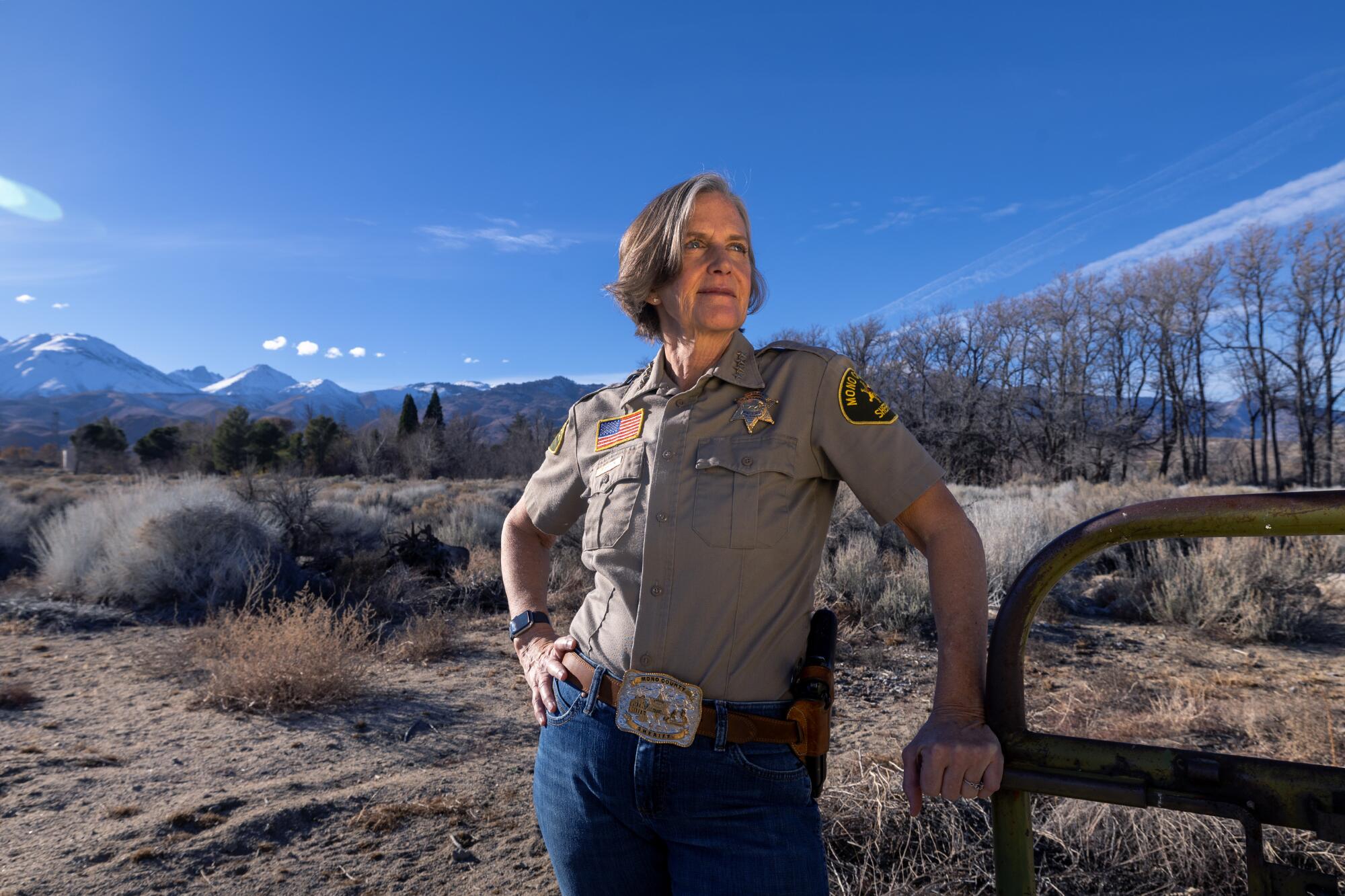
Mono County Sheriff Ingrid Braun worries that fear of federal immigration agents will prevent crime victims from reaching out to her for help.
(Brian van der Brug / Los Angeles Times)
A few years ago, his kidneys failed. He was able to get dialysis and, eventually, a transplant, thanks to the health insurance Maria gets through her job at the school district. But he now depends on very specific medication to stay alive, Maria said.
If he gets deported and has to return to the village they’re from in Michoacan, Maria worries that he’ll lose access to the lifesaving pills.
“People in Mexico die from things like that,” she said.
Like many law enforcement officers in California, Mono County Sheriff Ingrid Braun said she won’t help round up undocumented residents for deportation. But she worries that fear of federal immigration agents will prevent people from reaching out to her for help when they’ve been robbed, assaulted by a romantic partner or otherwise victimized.
“They’re not going to call if they’re afraid he’s going to get deported, or that they’ll be separated from their kids,” Braun said.
For the moment, Braun said, she’s skeptical the roundups will actually materialize. “I don’t think they have a plan. I think it was all a bunch of talk,” she said.
Though she can’t do anything to stop federal agents if they show up, she said, news travels fast in a small town and she thinks outsiders who don’t know the lay of the land would struggle to catch locals who would almost certainly know they were coming.

Mammoth High School students walk home after school in Mammoth Lakes.
(Brian van der Brug / Los Angeles Times)
She also thinks the disruption to the economy would be so severe that immigration officials would get little cooperation from others in town. One way or another, most everyone here depends on the immigrants.
“People think resort towns like Mammoth are just full of rich people playing,” Braun said. But it’s immigrants who do all the work and keep the “industry humming.”
Source link







